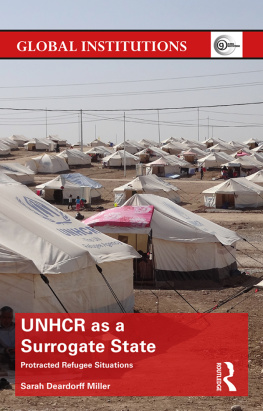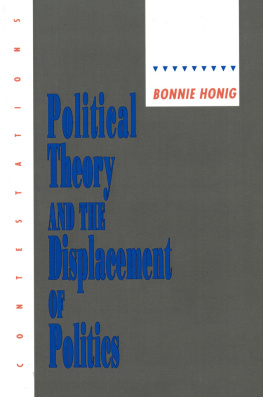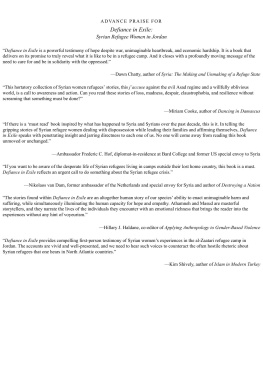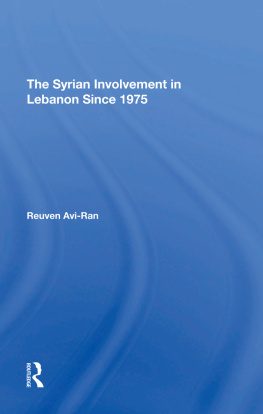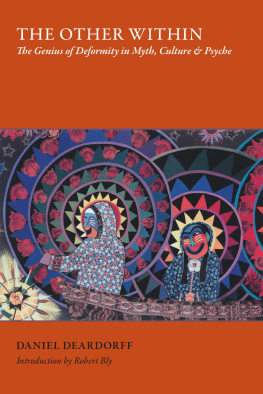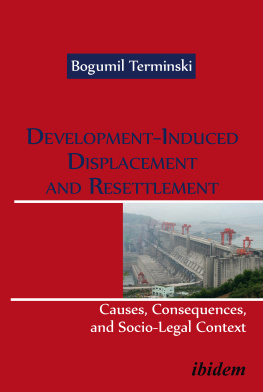Political and Humanitarian Responses to Syrian Displacement
This book examines Syrian displacement since the start of the 2011 conflict. It considers how neighboring refugee-hosting states namely Jordan, Turkey and Lebanon have responded to Syrian refugees, as well as how the international humanitarian community has assisted and protected refugees and internally displaced persons (IDPs). Miller examines Syrian displacement as it relates to EU and US policies, and relates Syrian displacement to broader themes and debates on the international refugee regime and humanitarian intervention.
The book argues that displacement is not a mere symptom or byproduct of the conflict in Syria, but a key variable that must be addressed with any peace plan or strategy for ending the conflict and rebuilding Syria. Responses to displacement should therefore not just be thought of in a humanitarian context, but also as a political, security and economic issue.
Drawing on media reports, research briefs, scholarly books and articles, NGO reports and UN research to contextualize and critically analyze the blur of headlines and rhetoric on Syria, the book seeks to shed light on the political and humanitarian responses to displacement. It seeks to inform policymakers, practitioners and scholars about the current Syrian displacement situation, helping to make sense of the ocmplex web of literature on Syrian refugees and IDPs.
Sarah Deardorff Miller is Adjunct Faculty in the School of International Service at American University in Washington, D.C., USA and the University of London, School of Advanced Study, UK.
First published 2017
by Routledge
2 Park Square, Milton Park, Abingdon, Oxon OX14 4RN
and by Routledge
711 Third Avenue, New York, NY 10017
Routledge is an imprint of the Taylor & Francis Group, an informa business
2017 Sarah Deardorff Miller
The right of Sarah Deardorff Miller to be identified as author of this work has been asserted by her in accordance with sections 77 and 78 of the Copyright, Designs and Patents Act 1988.
All rights reserved. No part of this book may be reprinted or reproduced or utilised in any form or by any electronic, mechanical, or other means, now known or hereafter invented, including photocopying and recording, or in any information storage or retrieval system, without permission in writing from the publishers.
Trademark notice: Product or corporate names may be trademarks or registered trademarks, and are used only for identification and explanation without intent to infringe.
British Library Cataloguing in Publication Data
A catalogue record for this book is available from the British Library
Library of Congress Cataloging in Publication Data
Names: Deardorff Miller, Sarah, author.
Title: Political and humanitarian responses to Syrian displacement /
Sarah Deardorff Miller.
Description: Abingdon, Oxon ; New York, NY : Routledge, 2017. |
Includes bibliographical references and index.
Identifiers: LCCN 2016038008 | ISBN 9781138209800 (hardback) |
ISBN 9781315456737 (ebook)
Subjects: LCSH: RefugeesSyria. | RefugeesInternational
cooperation. | Humanitarian assistanceSyria. | Syria
HistoryCivil War, 2011Refugees.
Classification: LCC HV640.5.S97 D43 2017 | DDC 956.9104/2dc23
LC record available at https://lccn.loc.gov/2016038008
ISBN: 978-1-138-20980-0 (hbk)
ISBN: 978-1-31545-673-7 (ebk)
Typeset in Times New Roman
by Apex CoVantage, LLC
Syrian displacement since 2011 is among the worst in a generation. It has dominated headlines and altered the political and humanitarian landscape across the Middle East, Europe and beyond. It has evoked comments and action from figures like the Pope, rock stars and world leaders alike. And while there are certainly other conflicts and situations of displacement around the world, Syria is proving to be a game changer for how states, humanitarian actors and others respond to displacement.
Since 2011, the world has watched as violence has torn Syria apart, forcing millions to be displaced from their homes. There are some 4.8 million refugees that have fled to neighboring Jordan, Lebanon and Turkey, with smaller numbers going to Iraq, Egypt and beyond. Another 6.6 million have been displaced within Syria.1 They are often the most vulnerable, including the elderly, disabled and sick, and have sought refuge with family and friends, or wherever they can find it.


